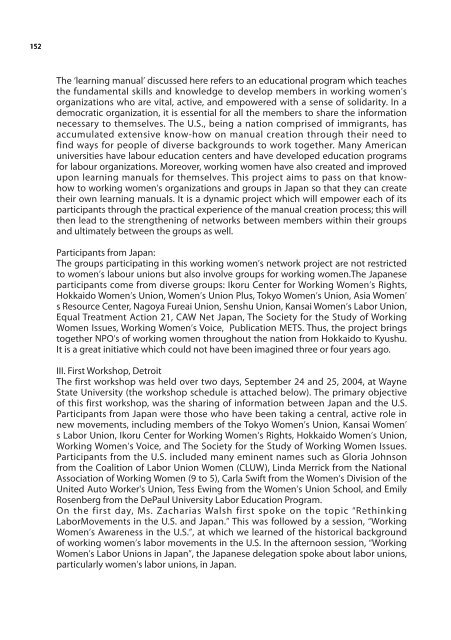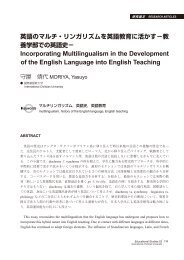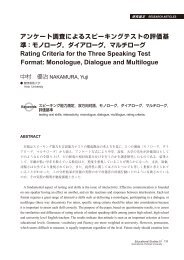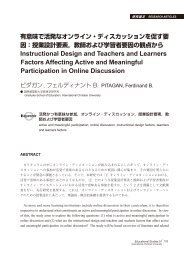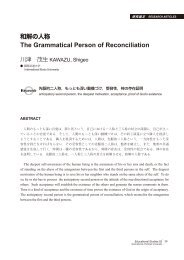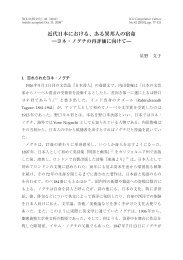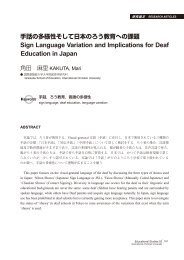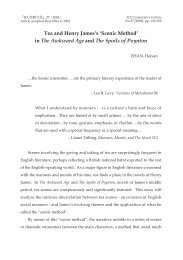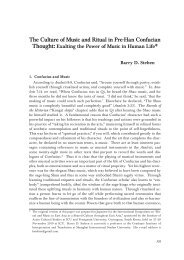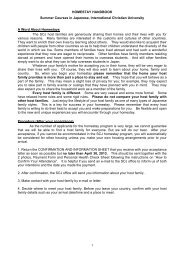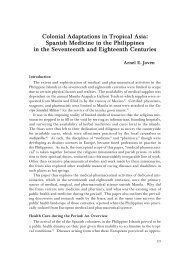Untitled - subsite - å½éåºç£æ大å¦
Untitled - subsite - å½éåºç£æ大å¦
Untitled - subsite - å½éåºç£æ大å¦
You also want an ePaper? Increase the reach of your titles
YUMPU automatically turns print PDFs into web optimized ePapers that Google loves.
152<br />
The learning manual discussed here refers to an educational program which teaches<br />
the fundamental skills and knowledge to develop members in working womens<br />
organizations who are vital, active, and empowered with a sense of solidarity. In a<br />
democratic organization, it is essential for all the members to share the information<br />
necessary to themselves. The U.S., being a nation comprised of immigrants, has<br />
accumulated extensive know-how on manual creation through their need to<br />
find ways for people of diverse backgrounds to work together. Many American<br />
universities have labour education centers and have developed education programs<br />
for labour organizations. Moreover, working women have also created and improved<br />
upon learning manuals for themselves. This project aims to pass on that knowhow<br />
to working womens organizations and groups in Japan so that they can create<br />
their own learning manuals. It is a dynamic project which will empower each of its<br />
participants through the practical experience of the manual creation process; this will<br />
then lead to the strengthening of networks between members within their groups<br />
and ultimately between the groups as well.<br />
Participants from Japan:<br />
The groups participating in this working womens network project are not restricted<br />
to womens labour unions but also involve groups for working women.The Japanese<br />
participants come from diverse groups: Ikoru Center for Working Womens Rights,<br />
Hokkaido Womens Union, Womens Union Plus, Tokyo Womens Union, Asia Women<br />
s Resource Center, Nagoya Fureai Union, Senshu Union, Kansai Womens Labor Union,<br />
Equal Treatment Action 21, CAW Net Japan, The Society for the Study of Working<br />
Women Issues, Working Womens Voice, Publication METS. Thus, the project brings<br />
together NPOs of working women throughout the nation from Hokkaido to Kyushu.<br />
It is a great initiative which could not have been imagined three or four years ago.<br />
III. First Workshop, Detroit<br />
The first workshop was held over two days, September 24 and 25, 2004, at Wayne<br />
State University (the workshop schedule is attached below). The primary objective<br />
of this first workshop, was the sharing of information between Japan and the U.S.<br />
Participants from Japan were those who have been taking a central, active role in<br />
new movements, including members of the Tokyo Womens Union, Kansai Women<br />
s Labor Union, Ikoru Center for Working Womens Rights, Hokkaido Womens Union,<br />
Working Womens Voice, and The Society for the Study of Working Women Issues.<br />
Participants from the U.S. included many eminent names such as Gloria Johnson<br />
from the Coalition of Labor Union Women (CLUW), Linda Merrick from the National<br />
Association of Working Women (9 to 5), Carla Swift from the Womens Division of the<br />
United Auto Worker's Union, Tess Ewing from the Womens Union School, and Emily<br />
Rosenberg from the DePaul University Labor Education Program.<br />
On the first day, Ms. Zacharias Walsh first spoke on the topic Rethinking<br />
LaborMovements in the U.S. and Japan. This was followed by a session, Working<br />
Womens Awareness in the U.S., at which we learned of the historical background<br />
of working womens labor movements in the U.S. In the afternoon session, Working<br />
Womens Labor Unions in Japan, the Japanese delegation spoke about labor unions,<br />
particularly womens labor unions, in Japan.


